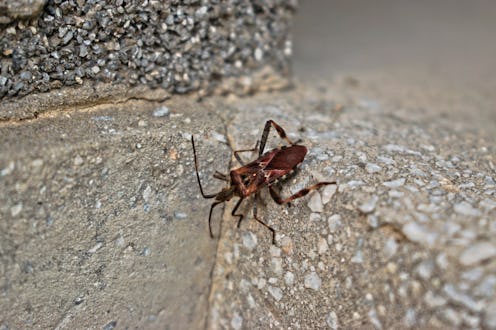Life
A Parasitic Illness Caused By A “Kissing Bug” Is Spreading In The U.S., Doctors Warn

If the threat of bed bugs weren't enough to make you want to sleep in a full bodysuit complete with a hoodie and face mask, Chagas disease, which is spread by the "kissing bug," has been found in 28 states in the United States, a new report from the American Heart Association says, with a potential 300,000 Americans infected. And, similar to bed bugs, triatomine bugs bite at night. Unlike bed bugs, which are more of a physical nuisance and mental nightmare, kissing bugs do transmit disease. According to a research team based at Texas A&M University, 50 percent of triatomine bugs are infected with Chagas disease, a potentially life-threatening illness that's easily spread to humans.
These insects, which can grow to the size of a penny, are referred to as kissing bugs because they tend to bite unsuspecting sleepers on the face, the Centers for Disease Control and Prevention noted on its website. "After they bite and ingest blood, they defecate on the person. The person can become infected if T. cruzi parasites in the bug feces enter the body through mucous membranes or breaks in the skin," the CDC explained.
"The unsuspecting, sleeping person may accidentally scratch or rub the feces into the bite wound, eyes, or mouth." If you wake up with a cluster of bites, and you can definitively rule out bed bugs, be on the lookout for kissing bugs, which are winged and often have red, orange, or yellow stripes. Once you know you've been a blood meal for these pests, you'll want to monitor yourself for signs and symptoms of Chagas disease, which can lead to serious heart and intestinal complications if left untreated.
The good news is that kissing bugs rarely come inside. However, if you've been camping in the southern or western United States, or in South, Central, or Latin America, you could get bitten. The CDC reported that Chagas disease has an acute and chronic phase. The acute phase can last anywhere from a few weeks to a few months, and symptoms tend to be mild. The disease can also be difficult to diagnose during this phase because symptoms like fever, fatigue, body aches, headache, and rash are common among other illnesses.
If you have these symptoms, and you've been in an area where kissing bugs are common, it's worth a trip to the doctor for a full exam. "The signs on physical examination can include mild enlargement of the liver or spleen, swollen glands, and local swelling (a chagoma) where the parasite entered the body," the CDC explained. "The most recognized marker of acute Chagas disease is called Romaña’s sign, which includes swelling of the eyelids on the side of the face near the bite wound or where the bug feces were deposited or accidentally rubbed into the eye."
Even if your symptoms go away, that doesn't mean you've recovered. If left untreated, the disease can enter a chronic phase where you might not experience any symptoms for decades. People with chronic Chagas disease are at risk for developing fatal cardiac complications that include an enlarged heart, heart failure, and heart attack.
The chronic phase of the disease can also manifest as an enlarged esophagus (megaesophagus) or colon (megacolon), which can make it difficult to eat and to go to the bathroom. The disease can also affect animals, so it's important to keep your cat or dog inside at night when kissing bugs are most active. Chagas disease is treatable, especially if it's caught early.
If you already have a trip planned to an area where the kissing bug is common, there are some ways to minimize your risk. "Travelers who sleep indoors, in well-constructed facilities (for example, air-conditioned or screened hotel rooms), are at low risk for exposure to infected triatomine bugs, which infest poor-quality dwellings and are most active at night," the CDC noted. "Preventive measures include spraying infested dwellings with residual-action insecticides, using bed nets treated with long-lasting insecticides, wearing protective clothing, and applying insect repellent to exposed skin."
In general, this is a classic case of #TheMoreYouKnow. While the kissing bug is present in the United States, it's more common in South, Central, and Latin America. But, because it's known as the silent killer for its lack of symptoms and long period of dormancy, being aware of the kissing bug and Chagas disease can help you identify a possible infection, and it might even save your life. After all, knowledge is power.